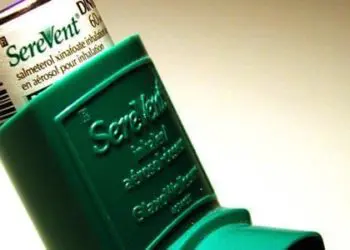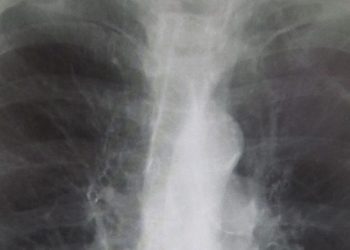Dupilumab reduces systemic glucocorticoid use in severe asthmatics
1. Glucocorticoid dependent severe asthmatics treated with dupilumab for 24 weeks used significantly lower doses of glucocorticoids while maintaining asthmatic control compared to placebo treated patients.
2. Dupilumab treated patients experienced lower rates of severe asthma exacerbations compared to those treated with placebo.
Evidence Rating Level: 1 (Excellent)
Study Rundown: Patients with severe asthma often utilize systemic glucocorticoids to reduce respiratory inflammation. These agents are nonselective, associated with numerous side effects, and are immunosuppressive. Type 2 inflammation involved in asthma can be more selectively targeted through the interleukin-4 receptor. The monoclonal antibody dupilumab has been used to reduce type 2 inflammation in other inflammatory conditions and has potential to be used in glucocorticoid depended severe asthmatics to reduce glucocorticoid use. This phase 3 randomized study, the LIBERTY ASTHMA VENTURE trial, treated patients with dupilumab and placebo for 24 weeks and found a significant reduction in glucocorticoid use in the dupilumab group, all while asthmatic symptom control was maintained. Dupilumab treated patients also had a lower rate of severe asthma exacerbations and a higher forced expiratory volume in 1 second (FEV1) than those in the placebo group.
Strengths of this study included evaluation of laboratory inflammation markers in addition to clinical markers of efficacy and strong subgroup outcomes analysis. Limitations include a short evaluation period and lack of discussion of treatment cost.
Click to read the study, published in NEJM
Relevant Reading: Dupilumab treatment in adults with moderate-to-severe atopic dermatitis
In-Depth [randomized controlled trial]: This phase 3 randomized controlled trial was conducted between 2015 and 2017. Eligible patients were 12 or older and had been receiving systemic glucocorticoids for last 6 months for diagnosed asthma. Patients were randomized to a dupilumab group (n = 103) who received subcutaneous dupilumab biweekly for 24 weeks or a placebo group (n = 107). Glucocorticoids were reduced until they had an increase of 0.5 on the Asthma Control Questionnaire (ACQ-5), a severe exacerbation, or a clinical need for increased glucocorticoids. The primary end-point was percent reduction from baseline to week 24 of glucocorticoid dose while asthma control was maintained. Key secondary outcomes included proportion of patients with at least a 50% reduction in glucocorticoid dose and proportion of patients who used a minimal dose of systemic glucocorticoids.
Glucocorticoids were reduced in the treatment group by 70.1% and in the placebo group by 41.9% (p < 0.001). Reduction in glucocorticoid use by 50% or more occurred in 80% of treatment and 50% of placebo patients (p < 0.001) and use of less than 5mg prednisone a day occurred in 69% of the treatment and 33% of the placebo groups (p < 0.001). Dupilumab was associated with a 59% lower rate of severe asthma exacerbations (95% confidence interval [CI], 37 to 74). FEV1 was an average of 0.22 liters (95% CI, 0.09 to 0.34) higher in the treatment group. Adverse events occurred at similar rates between the two trial groups, with serious adverse events occurring in 9% of treatment and 6% of placebo patients.
Image: PD
©2018 2 Minute Medicine, Inc. All rights reserved. No works may be reproduced without expressed written consent from 2 Minute Medicine, Inc. Inquire about licensing here. No article should be construed as medical advice and is not intended as such by the authors or by 2 Minute Medicine, Inc.






